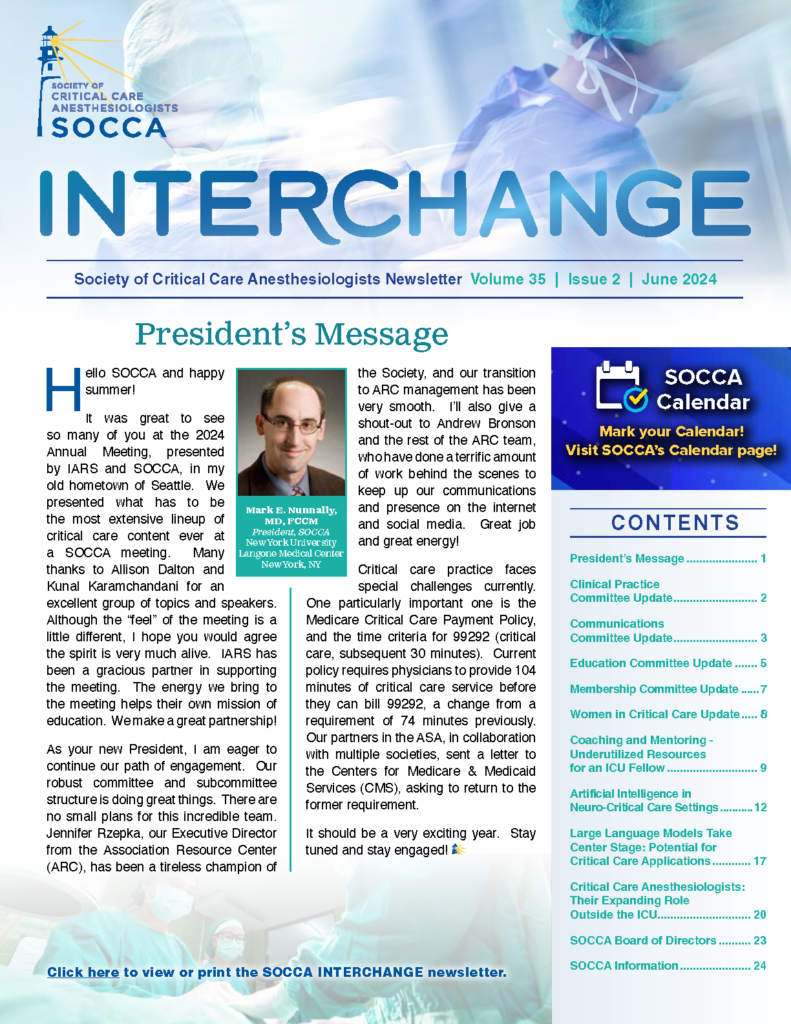Research Spotlight
I was exposed to research early in my training as an anesthesiology resident at the University of Maryland in the late 1990s, where I had the fortune of training with Dr. Jane Matjasko, our department chair. As a pioneer in neuroanesthesia, she worked diligently to understand the complexities of anesthetic effects on the brain. She was one of the inaugural members of SNACC (Society of Neuroscience in Anesthesiology and Critical Care) and among the first graduates of the Women’s Medical College of Pennsylvania (now Drexel University). She inspired me to become an academic anesthesiologist who was passionate not only about patient care but also about asking questions, being industrious, and finding the answers through research.
Dr. Mary Njoku was another amazing role model who inspired me to pursue critical care and become a woman intensivist. She highlighted the importance of bringing a humanistic aspect to the care of patients and families in the ICU. During my Critical Care fellowship at Columbia University, I had the opportunity to work amongst amazing scholars and clinicians such as Dr. Robert Sladen (the fellowship program director and Vice Chair), Dr. Margaret Wood (Chair), and Dr. Desmond Jordan. Having them as mentors and advocates during a fellowship year in New York when 9/11 devastated the world was very special to me. With their support and encouragement, I published my first peer-reviewed manuscript and have been hooked ever since.
I continued my journey in academic medicine in Asia (following my husband’s jobs) where I worked as an intensivist and anesthesiologist. I completed a Master’s degree in medical ethics from the National University of Singapore. I was touched by the predicament of families of elderly patients in the ICU and wanted to understand the perspectives and dilemmas that these tensions hold. I was also fortunate to receive national grants on multiracial genetic aspects of sepsis in critically ill patients. While living abroad, I continued to be actively involved in various academic societies here in the US, including SOCCA, the Society of Critical Care Medicine (SCCM), and the Critical Care Medicine committee of the ASA. I returned to the US just before the start of the pandemic under the leadership of Dr. Daniel Talmor at Beth Israel Deaconess Medical Center (BIDMC). I was especially attracted to BIDMC given its history of research excellence and limitless opportunities. Since then, I have continued to focus on scientific investigations centered on humanities, compassion, cross cultural ethics, racial injustice in end of life care, and women in medicine and critical care.
As an ethicist and anesthesiologist-intensivist, I have incorporated my interest and training in medical ethics in the social and clinical aspects of family and patient care in the ICU. I spearheaded the creation of ethics rounds for our trainees in the ICU and created an interprofessional module for nurses, residents, and students to discuss real life case vignettes with important ethical and moral dilemmas. At BIDMC, I am currently conducting a study in collaboration with representatives from SCCM, SOCCA, the Schwartz Center for Compassionate Care, and ESICM on compassionate care in the ICU. I am also working with SOCCA on a member survey regarding professional fulfillment and burnout amongst intensivists. My work is currently supported by BIDMC Healthcare Delivery Science and John Hedley Whyte grants, and a complete list of my publications may be found online. I currently serve on the Board of Directors of SOCCA and co-chair the SOCCA Women in Critical Care Working Group. I look forward to collaborating with SOCCA members for the advancement of humanities research in critical illness.




































